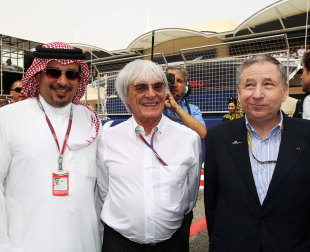
To the intense relief of all concerned, the Bahrain Grand Prix passed off without major disruption to anyone at the security-laden Bahrain International Circuit, even if away from the blinkered, surreal world of Formula One the casualties continued to pile up.
Despite the at times childish utterances of Bernie Ecclestone and the arrogant near silence of Jean Todt, the events of the past few weeks have damaged the image of Formula One and the blame for that lies entirely with them.
That Formula One is a world dominated by dollars is hardly news. But the way over the last fortnight that Ecclestone in particular has continued to not only insist the race should go ahead but lambasted anyone who dare suggest otherwise verged on the incredible. He has emerged as a greed-obsessed, uncaring, almost comical (in the worst sense) caricature. As he counts the money earned from Bahrain that is unlikely to weigh heavily on him.
In the dying days of the Saddam Hussein regime, Mohammed Saeed al-Sahhaf, the Iraqi minister of information, became infamous for his ludicrous pronouncements culminating in his claim American troops were about to surrender as behind him US tanks could be seen rumbling into Baghdad. Ecclestone's skewed take on politics and Bahrain have been almost as ludicrous, with the nadir coming with his flippant post-race aside: "You know what they say - there is no such thing as bad publicity".
Such was the determination of Ecclestone and Todt (whose son must have been delighted to see the GP2 races pass without incident given he has a financial interest in it along with Bahrain's crown prince) to stage the race it was always going to happen. In a police state where violent repression is the norm, safeguarding the circuit was not going to be a concern, but Ecclestone and Todt were still prepared to risk the safety of all those associated with the sport to make their point.
However, they and the sport could still have emerged with some vestige of respect. Some open and honest comment would have been a start, a willingness to admit that all was not well. Perhaps a fraction of the millions of dollars generated from the weekend could have been donated to an apolitical NGO such as the Red Cross or Médecins Sans Frontières.
Instead the world got denial and lectures, while journalists who dared to show Formula One in anything other than a glowing light were sought out publically and privately for browbeating.
And so the Formula One roadshow moves on to Europe. It arrives looking a little more grubby and a lot more like an irresponsible and uncaring cashcow for owners and sponsors. Meanwhile, in Bahrain the human rights abuses will continue. That won't be of any concern to those running the sport for at least another year. As if it ever was.
Martin Williamson is managing editor of digital media ESPN EMEA
© ESPN Sports Media Ltd.
 Martin Williamson is managing editor of digital media ESPN EMEA Martin Williamson, who grew up in the era of James Hunt, Niki Lauda and sideburns, became managing editor of ESPN EMEA Digital Group in 2007 after spells with Sky Sports, Sportal and Cricinfo
Martin Williamson is managing editor of digital media ESPN EMEA Martin Williamson, who grew up in the era of James Hunt, Niki Lauda and sideburns, became managing editor of ESPN EMEA Digital Group in 2007 after spells with Sky Sports, Sportal and Cricinfo

